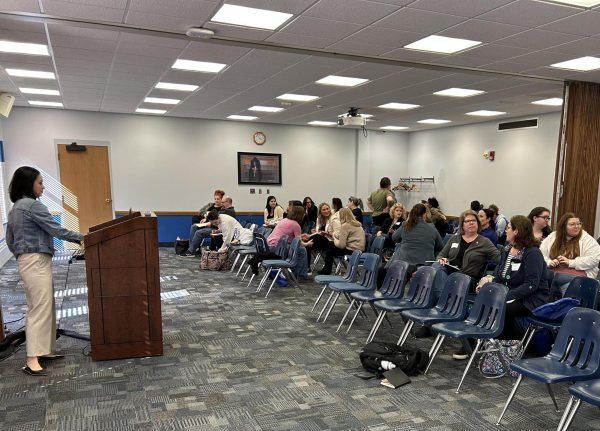Bailiff witnesses changes in Charleston over years
Editor’s Note: This is a day in the life series, which focuses on individuals in Charleston.
At 8 a.m. the Charleston Courthouse is only lightly populated with attorneys and judges filing in here and there, clutching mugs of coffee and overstuffed files.
The Rolling Stones’ “(I Can’t Get No) Satisfaction” hums through the security station as the officers prepare for the rush of people they will eventually see today.
Mike Curtis, a bailiff at the courthouse, has witnessed this morning routine for more than a decade.
Curtis, who has had careers in law enforcement and the Illinois Department of Transportation, said his favorite job has been the ones dealing with the law.
After entering into law enforcement in 1962, about 10 years after he graduated high school, Curtis said he took the test and was surprised to find that he ranked the third highest and had a knack for law enforcement.
When he became sheriff in 1966, Curtis only had nine officers, two squad cars and a monthly salary of $370.
Curtis said he ran for sheriff only because the person who was running against him would not keep him as a deputy if he won the position.
“I made a point to beat him,” Curtis said. “I worked hard at it.”
Curtis said when he was a sheriff in the ‘60s, the types of crimes he saw varied differently in comparison to today.
“Our problems then where a lot different than now,” Curtis said.
He said drugs were not as big of a problem then it is today, but alcohol infractions have always been a problem.
Curtis said one time a man came into court late to see the judge and was “so drunk he was falling down.” He said when the judge asked him why he was late, the man said he got stuck in traffic.
“We all laughed because if he was driving, we were all in trouble,” Curtis said.
Curtis said the most common occurrences that manage to get defendants in trouble are missing appointments with the court. If a defendant misses an appointment with the court, the judge can file a warrant for arrest for failure to appear in court, he said.
The most common infractions that he sees in Charleston are minors possessing alcohol, truancy, operating under the influence, methamphetamine possession and underage tobacco use, he said.
Curtis said he was the bailiff in the longest felony court case, the 2001 murder of Eastern student Shannon McNamara where Eastern student Anthony Mertz was charged with her murder.
Curtis said in remembrance of her, he planted a white pine on his property.
“We all kind of felt like it was our fault,” Curtis said.
Curtis said another memorable case happened when he was sheriff and a man, who had been in and out of jail plenty of times, came into the jail and was complaining about his wife.
The man asked what would get him six months in jail, and Curtis said he thought he was joking and said that if he took a swing at him then that would probably do it.
Curtis said the man knocked out a deputy and when a judge sentenced him, he was given nine months.
“And he said (to the judge) ‘I only wanted six months your honor,’” Curtis said. “We had some really colorful people back then.”
Kathryn Richter can be reached at 581-2812 or kjrichter@eiu.edu.






![[Thumbnail Edition] Charleston High School sophomore Railyn Cox pitches the ball during Charleston's 8-7 win over Flora High School on Monday, March 31.](https://www.dailyeasternnews.com/wp-content/uploads/2025/04/SBHS_01_O-1-e1743982413843-1200x1023.jpg)
![[Thumbnail Edition] Eastern Illinois softball senior infielder Briana Gonzalez resetting in the batter's box after a pitch at Williams Field during Eastern’s first game against Southeast Missouri State as Eastern split the games as Eastern lost the first game 3-0 and won the second 8-5 on March 28.](https://www.dailyeasternnews.com/wp-content/uploads/2025/04/SBSEMO_11_O-1-e1743993806746-1200x692.jpg)





![[Thumbnail Edition] Junior right-handed Pitcher Lukas Touma catches at the game against Bradley University Tuesday](https://www.dailyeasternnews.com/wp-content/uploads/2025/03/MBSN_14_O-e1743293284377-1200x670.jpg)
![[Thumbnail Edition] Senior Foward Macy McGlone, getsw the ball and gets the point during the first half of the game aginst Western Illinois University,, Eastern Illinois University Lost to Western Illinois University Thursday March 6 20205, 78-75 EIU lost making it the end of their season](https://www.dailyeasternnews.com/wp-content/uploads/2025/03/WBB_OVC_03_O-1-e1743361637111-1200x614.jpg)






































![The Weeklings lead guitarist John Merjave [Left] and guitarist Bob Burger [Right] perform "I Am the Walrus" at The Weeklings Beatles Bash concert in the Dvorak Concert Hall on Saturday.](https://www.dailyeasternnews.com/wp-content/uploads/2025/03/WL_01_O-1200x900.jpg)
![The team listens as its captain Patience Cox [Number 25] lectures to them about what's appropriate to talk about through practice during "The Wolves" on Thursday, March 6, in the Black Box Theatre in the Doudna Fine Arts Center in Charleston, Ill.](https://www.dailyeasternnews.com/wp-content/uploads/2025/03/WolvesPre-12-1200x800.jpg)

















